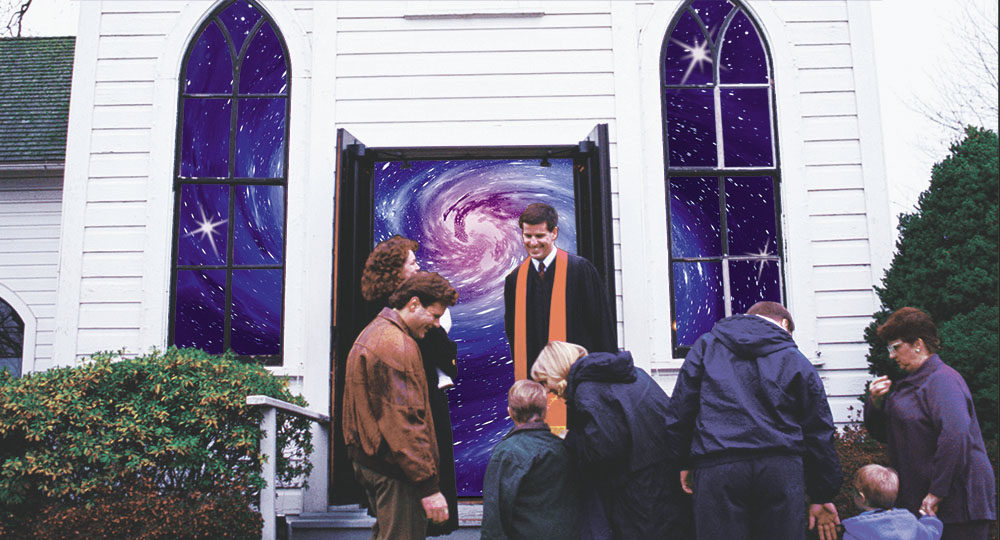The Church in the New Millennium
The apostle Paul evidenced surprise when the first generation of Christians began to pass away. Today the second millennium of church history is about to give way to a third. Well might witnessing saints in glory be whispering to one another, “Who would have thought it?” But thus have the providences of God unfolded. What lies in store for the third millennium—or that portion remaining until the Lord returns? Unfortunately, four dangerous tendencies seem alarmingly pervasive.
An Unprincipled Passion for Unity
“The gospel will be more powerful and biblical ideals more pervasive if we abandon doctrinal distinctives and join all who name the name of Christ in one grand chorus of witness to the world!” Such is the theme of an ecumenism that has been remarkably durable in this century. Whereas many believers today crave unity, previous generations of Christian thinkers preferred to pursue doctrinal precision.
Martin Luther, for example, firmly distinguished between imparted righteousness, which he denounced as heretical, and imputed righteousness. Imparted righteousness is said to have been provided by Christ but mediated only through the sacraments and the Roman Catholic Church. Paul, however, spoke in Romans of an imputed righteousness—the very righteousness of Christ graciously applied to a sinner at the moment of his salvation. It is this imputed righteousness that enables the sinner, from that moment forward, to stand legally faultless before a holy and righteous God.
Such deliberate theological precision was the essence of Reformation thought. Yet many today challenge the legitimacy of making such distinctions. In fact, no more pernicious notion ever arose than that the cause of Christ is crippled when men are too passionate about the truth of God’s Word. Revealed truth is never an impediment to unity. Admittedly, many have often preached a separatism based on standards of their own invention. But such misfocused zeal does not minimize the believer’s obligation to “Buy the truth, and sell it not” (Prov. 23:23). It is unbiblical to forsake truth in exchange for a superficial unity with those who embrace different doctrine. Just as there is no excuse for jeopardizing unity unless warranted by the clear standards and truths of the Word of God, so there is no justification for insisting upon so-called unity at the expense of what the Scriptures clearly teach.
A Functional Denial of the Sufficiency of Scripture
Satan’s scalpel is never sharper than when it is used to sever believers from their faith in the authority and sufficiency of Scripture. The devil and his minions evidently work overtime to convince Christians that one may pay lip service to the authority of God’s Word, but no modern, thinking person would actually live by it. Although many diabolical strategies are at work to that end, the harbinger of the greatest evil appears to be deconstructionism: the written word only means what you think it means.
To the deconstructionist, all communication is a struggle over power. The reader/listener must therefore strip away what appears to be the meaning of the written or spoken word (deconstruct the message), then reconstruct the message according to his own agenda. Deconstructionists argue that because the listener/hearer brings his own frame of reference, longings, and intentions, he alone must determine the meaning of a message, not the speaker/writer. Consequently, no message can mean anything for certain; objective communication is impossible, objective truth imaginary. As for the Bible, it degenerates into whatever each individual would like it to be. (Evidently the purveyors of this philosophy believe it doesn’t apply to them because they explain to you the impossibility of explaining anything!)
The meaning of Scripture is fixed regardless of whether it is fully understood. God knows how to say what He means, and He means what He says. Any person who manipulates the message of the Bible to his own liking, rather than accepting what the Sovereign God has spoken, will answer to the Lord. For this reason a good Bible student bathes his study in prayer. He asks the Spirit to “illumine” him—to help him think God’s thoughts rather than his own. He works to understand the culture from which the message of Scripture grew and the languages in which the Bible was originally written; he struggles to grasp the Bible as a whole, so Scripture can correct him when his understanding of a given passage is wrong.
The deconstructionist mentality, however, has intruded upon the Christian world. It proffers the notion that a passage of Scripture may have more than one meaning— one for you and an entirely different one for me, or one for an earlier generation and another for a later. After all, says the deconstructionist, it is the reader who determines meaning. No, it is not. This theory is filled with error. Certainly, there is truth to the bromide, “One meaning, many applications.” But every application must legitimately arise from the one fixed meaning of the passage. What did the original author mean when, by the Spirit of God, he spoke/wrote to the original audience? Why did he use the specific words he did and the specific grammatical constructions? This is the stuff of grammatical-historical interpretation, and applying these principles will protect the Christian from infusing a text with whatever meaning he would prefer it to have. If believers fail to hold fast to this basic principle of biblical interpretation, they will be easily deceived.
An Unconscionable Indifference Toward the Old Testament
The second stanza of the hymn, “Come, Thou Fount of Every Blessing” begins with a rich application of an Old Testament narrative:
Here I raise mine Ebenezer;
Hither by Thy help I’ve come;
And I trust by Thy good pleasure
Safely to arrive at home.
The allusion is to Samuel’s command that the victorious Israelites erect a memorial of stone and call it Ebenezer, which means, “Hitherto hath the Lord helped us” (1 Sam. 7:12). But look for that stanza in a recent hymnal. The allusion to the Old Testament narrative has been excised in favor of words that convey basically the same message, but that demand no familiarity with the Old Testament. Evidently the publishers despaired of the capacity of Christians today to associate the word Ebenezer with anything other than A Christmas Carol by Charles Dickens.
Unfortunately, the fate of those original words almost parallels the fate of the Old Testament among many believers. Too many Christians today appear satisfied with framing their lives around the New Testament exclusively and spend little if any time studying the other thirty-nine books of the Bible. This is a dangerous indifference. The Lord has affirmed the timeless value of the entire Word of God, as well as the believer’s responsibility to know and obey it (Mt. 5:17–18; Rom. 15:4; 1 Cor. 10:11; 2 Tim. 3:14–17). The Old Testament book of Daniel, for example, holds the key to understanding Jesus’ use of the phrase Son of man. In Daniel 7:13–14, as the Ancient of days sits to judge the succession of beastly Gentile empires that have so long ruled the earth, the “Son of man” appears and is given “ dominion, and glory, and a kingdom.”
Walter Kaiser identifies the Old Testament as “the most central and decisive problem for Christian theology.” He astutely argues that the attitude adopted toward the Old Testament “will automatically set much of our Christian theology—whether we do so in a deliberate or in an unreflective fashion” (Toward Rediscovering the Old Testament, Zondervan, Grand Rapids, 1987, p. 17). But many Christians today exhibit a careless indifference toward the Old Testament and are content to toss aside that body of sacred revelation.
Perhaps the greatest danger of such carelessness is that the believer who enjoys the blessings provided by the New Covenant will lose sight of the majesty of the God who made Himself so powerfully known in the Old Testament. Indeed, the greatest distinctive of the New Covenant is the indwelling Holy Spirit, who ministers to the believer an intimacy with God that would have been unthinkable in the Old Testament. We are privileged to call God Abba (Hebrew for “Father” [Rom. 8:15, Gal. 4:6]). But there is a sin that can beset anyone who enjoys such intimacy—the sin of careless familiarity. Such familiarity is manifested in many ways today: in the flippancy, shallowness, and marginal respect with which believers speak of the Eternal God; in the carelessness with which His commands and standards are regarded; in the self-centered character of worship.
Would all of this be corrected simply by paying greater attention to the Old Testament? Perhaps not. But there is no better antidote for such attitudes than to stand awestruck with the prophet Isaiah before the throne of a thrice-holy God, or to join voice with the sweet psalmist of Israel as he gives praise to the Lord who made heaven and earth, or to trace the narrative of the mighty acts of YHWH as He guards the character of His name in the face of attack by His enemies and carelessness by His people.
Without the Old Testament, it is also impossible to correctly understand the unique place God’s Chosen People occupy in world history and to understand the Jewish roots of Christianity. Danger awaits a Christian community that so easily takes for granted the grace offered in the New Testament while neglecting the firm foundation of the Old.
A Deliberate Disregard for the Eschatological Truths of Scripture
“The Bible is unclear about the end-times…eschatology [the study of future things] only divides Christians…just be a ‘pan’-millennialist—it will all pan out in the end.” Eschatological agnosticism appears to have become the fashion of the day. Certainly it will all “pan out” the way God intends, but that fact does not absolve believers of their obligation to study and believe the prophetic Scriptures that describe how it will all pan out. Approximately one-quarter of the Bible is predictive prophecy. Scripture not only admonishes Christians to be ever watchful (Mt. 24:42–43; 25:13; Mk. 13:33–37) but even confers a special blessing upon those who carefully study the portion that most completely unveils the grand climax that God has planned for history (Rev. 1:3; 22:7).
Clearly, end-times speculation that cannot be supported by Scripture is distracting at best and dangerous at worst. But the remedy for the abuse of eschatology is not to abandon it but to diligently honor the principles of sound, grammatical-historical interpretation. God alone knows the course church history will take during this next millennium. But if these developments continue, it is only logical to assume that doctrinal distinctives will disintegrate further in favor of an increasingly unbiblical unity. This may not bode well for Christians who refuse to submit and abandon their beliefs. We may become the problem that requires a solution.
The repercussions, however, stretch even further. Once men dispose of the true meaning of the Word of God, they can justify anything. Without faith in the sufficiency of Scripture and without the foundation of the Old Testament, it will become easier—even for Christians—to believe a lie. That is when Satan will run to his toolbox one more time and bring out his sharpest scalpel of all—violent, aggressive anti-Semitism. And who will know enough or care enough to resist him?







Brother, kindly help me to understand the position and action of new testament believers in the Millenium. My problem is – the raptured church is in spirit form; this church as the bride, going to come down with Christ to be with him for a thousand years. Now, the thousand years the Lord will rule a physical world – (the poor will be well-fed, the kings of the world will prostrate before the Lord, etc..). In what form the church will interact with the other group of people? old testament saints, new testament jews, and the erstwhile people of the world?
Kindly, clarify these points, please.
thank you